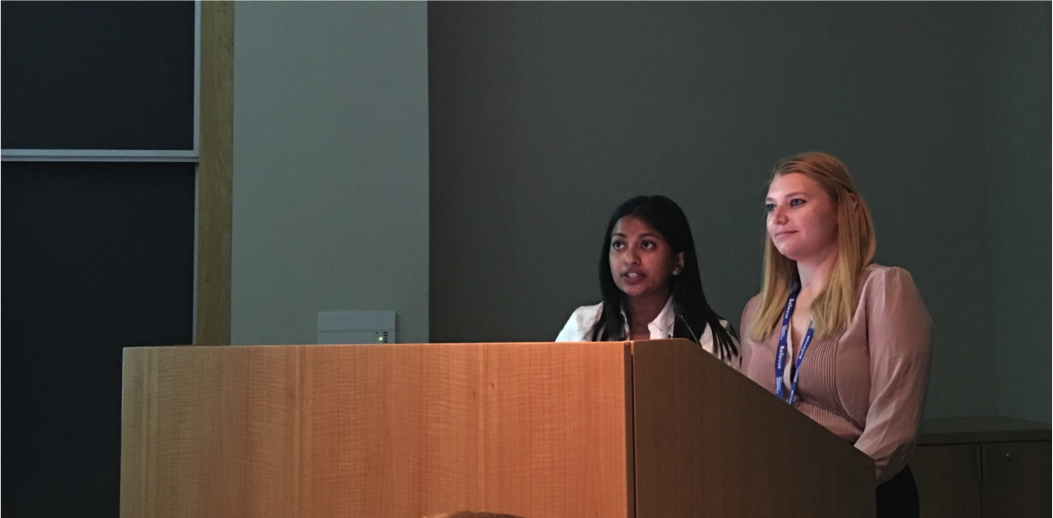Anita R. Mathew
Neonatology Anita R. Mathew, MBS TouroCOM-Harlem

Anita Mathew, President of the Internal Medicine Student Organization at TouroCOM-Harlem, participated this summer in the Jack Cary Eichenbaum Summer Scholars Program in Neonatology at New York University-Langone Medical Center.
At NYU, Anita worked with preterm infants (infants born before 37 weeks of gestational age). In the research project assigned to her, Mathew explored the effects of preeclampsia on neurodevelopmental outcomes in preterm infants.
Preeclampsia is a disorder characterized by hypertension and proteinuria or end-organ damage (or both), after 20 weeks of gestation in a pregnant woman. It occurs in about 4.6% of all pregnancies worldwide. When a woman has preeclampsia, the exposure to maternal hypertension limits the placental blood supply and the transfer of nutrients, so “it’s easy to see how it could potentially have an effect on the baby’s brain development,” explains Mathew.
Essentially, the team wanted to analyze whether there were any cognitive deficits found in premature infants who were born to mothers with preeclampsia, compared to premature infants whose mothers did not have preeclampsia. Mathew states “Because past literature offers conflicting and inconclusive opinions on this topic, we wanted to yield a more definitive conclusion to the question.”
Mathew and her team (which included NYU Langone neonatologists Dr. Michael Espiritu and Dr. Elena Wachtel, neonatology fellow Dr. Sourabh Verma, and an undergraduate student) went about answering this question by analyzing records of these infants’ progress from birth until age two. At both the 12- and 18-month markers, these children were assessed using a neurodevelopment scale to identify any developmental delays at NYU Langone’s clinic for high-risk infants, the Neonatal Comprehensive Care Program, while taking into account any confounding factors.
Ultimately, Mathew’s research team found no significant or statistical difference between the two groups, echoing other research that shows that preeclampsia does not have a detrimental effect on neurodevelopmental growth.
"Although infants born to mother with preeclampsia were born with significantly lower birth weight, they demonstrated no statistical difference in cognitive outcomes by 12 months of age, which may indicate that there was some sort of ‘catch-up’ as the preeclamptic patients grew older that diminished any potential differences in their abilities," said Mathew.
Mathew says the research process was an invaluable experience. “I really enjoyed seeing the progression to having tangible results and a final presentation. It was such a different experience seeing things I had learned in my books in school being brought to life in real clinical scenarios, and watching cases progress that I doubt I would be able to see anytime soon otherwise.” At the culmination of the program, Mathew formally presented her findings to senior members at NYU Langone, including Medical Directors of both NICUs (who also served as the coordinators of the program) and the Head of the Pediatrics Department.
In addition to her involvement in research, Mathew spent time onsite as well. She shadowed physicians in the labor & delivery unit, at the follow-up clinic for high-risk infants, and at the neonatology units at both Bellevue and Tisch Hospitals. One Bellevue NICU neonatologist in particular, Dr. Martha Caprio, was "amazing," she said: "Watching her interact with patients and their parents in such a compassionate manner, especially in a critical care environment where some patients don’t have the best prognosis, made a huge impression on me. She embodies the kind of physician I hope to be."
One of her favorite moments while shadowing in labor & delivery was witnessing a C-section, she said. "It's an experience that most rising second year medical students don't get to see, so I feel so lucky to have gotten the chance to. Maybe it's clichéd, but witnessing a birth really is as beautiful as everyone has told me."

